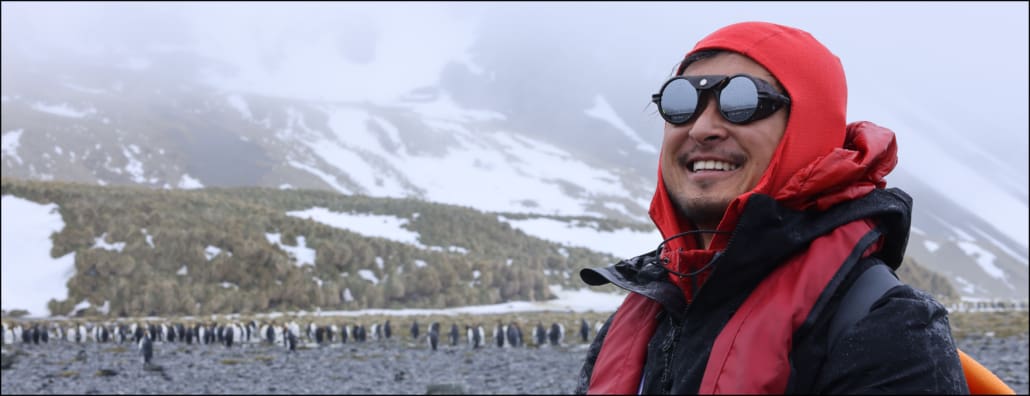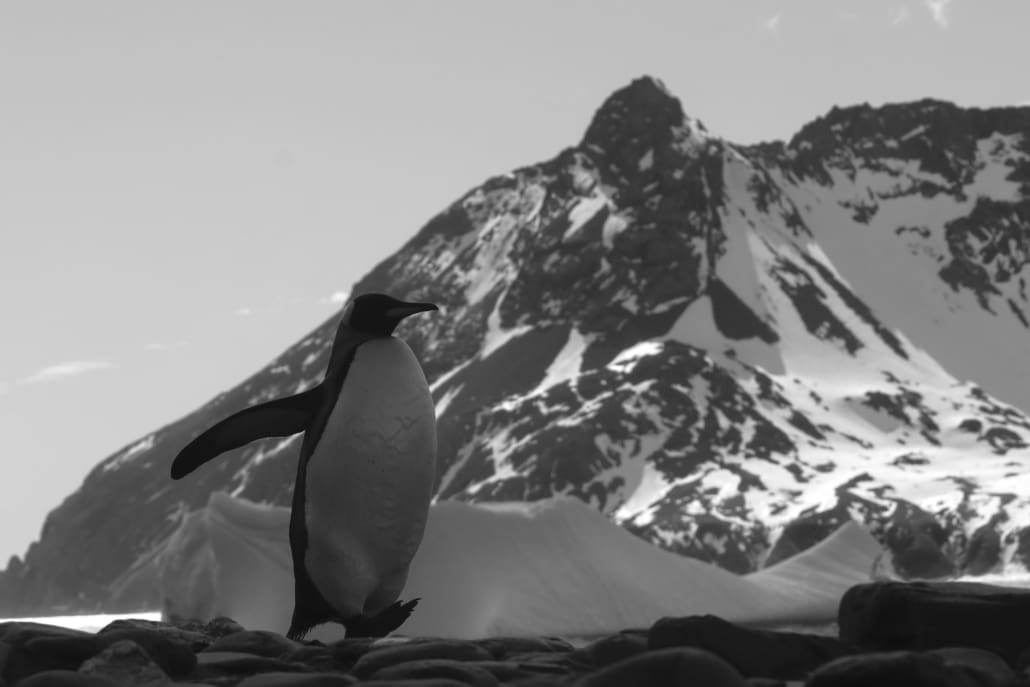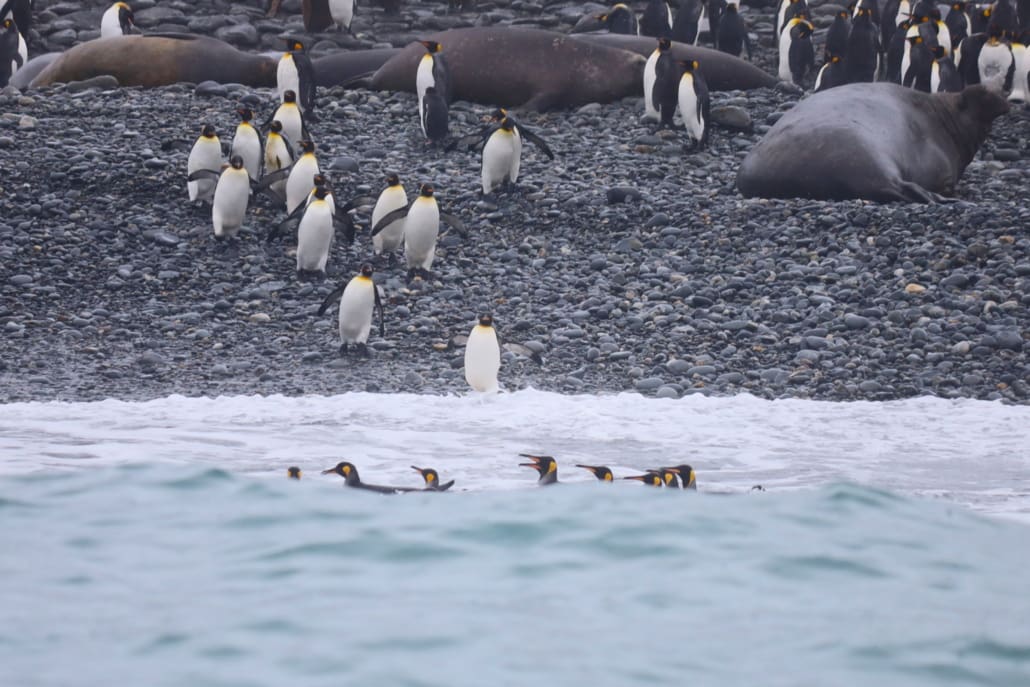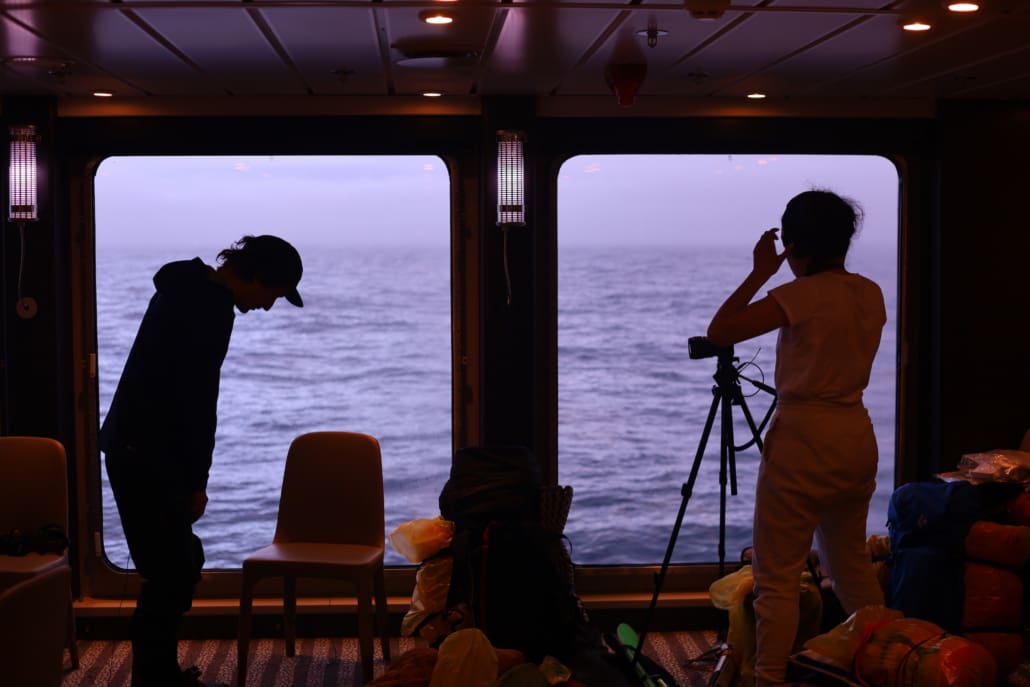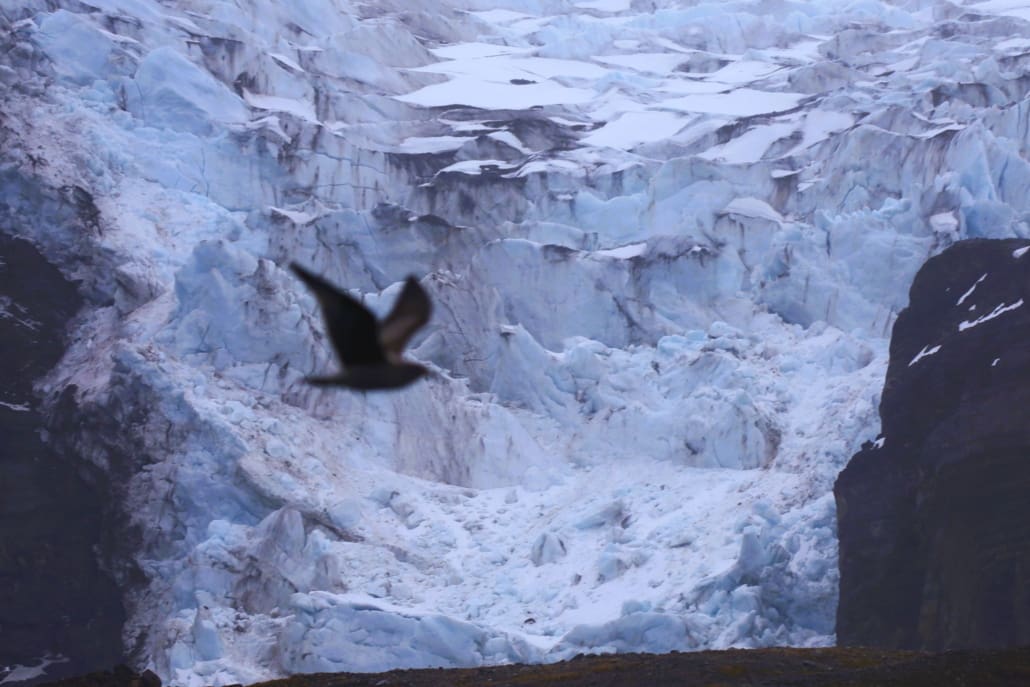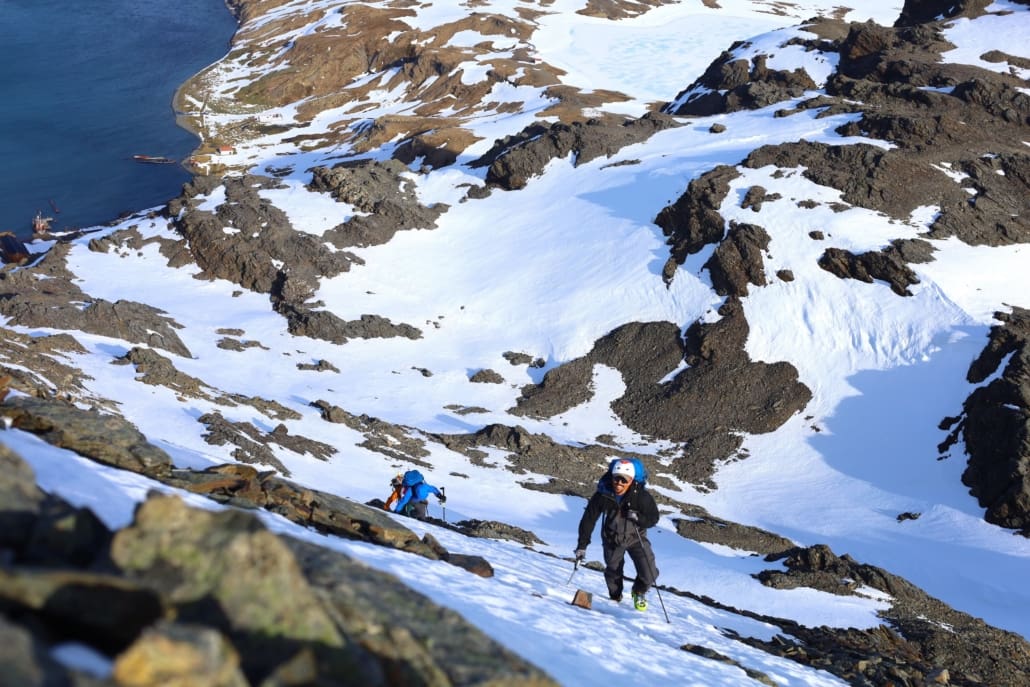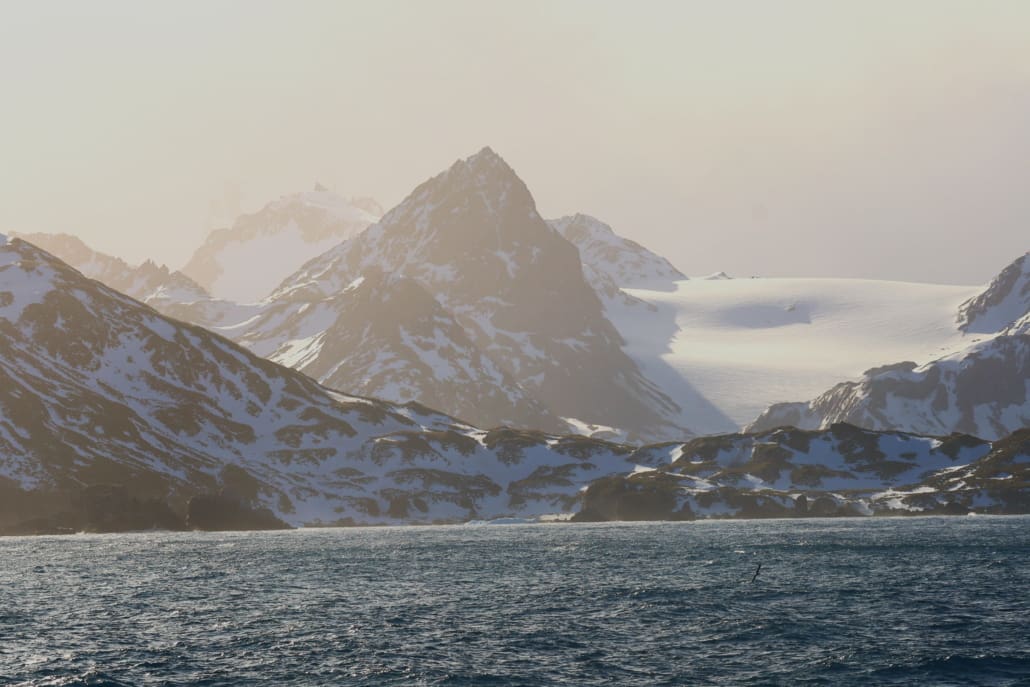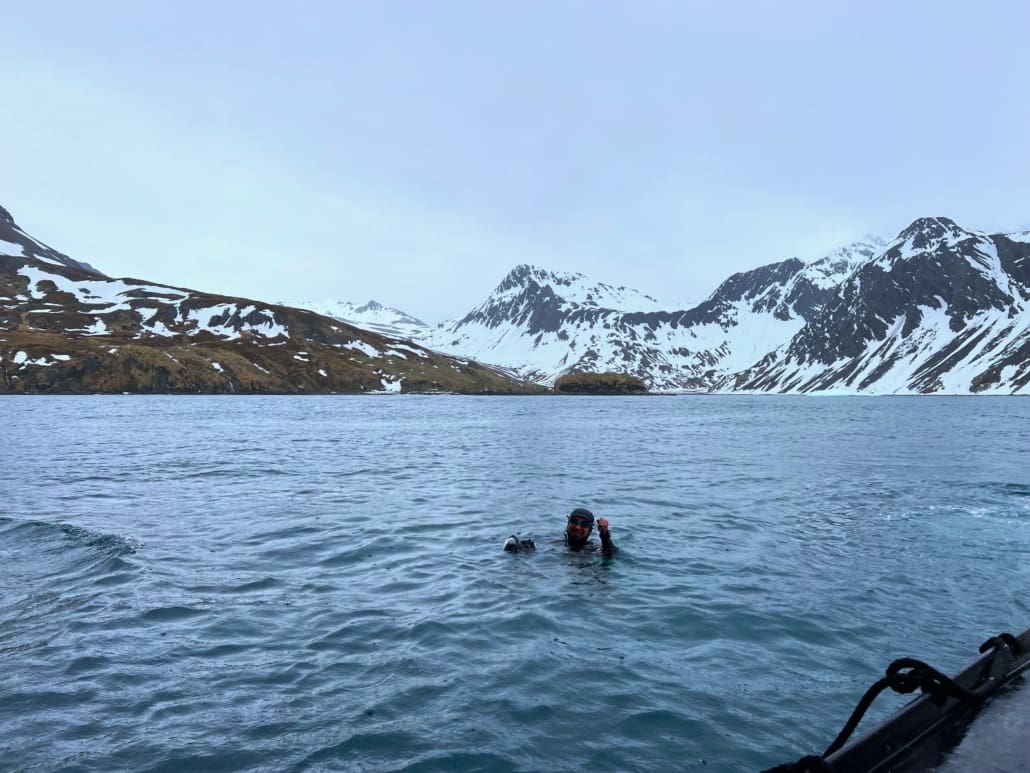Expedition Blog – Sasha Cheng, South Georgia 2023
To climb is to ascend. To where. To the heavens of course. Doing this while alive. Divine.
Before embarking on our expedition, I contemplated sharing in this blog post about the weather and climate. With MetService supporting the trip it made sense delving into the nuanced weather of South Georgia Island compared to New Zealand for fellow Kiwis and future alpinists. Alternatively, I considered exploring South Georgia Island and Antarctica through a Peace and Conflict Studies lens, given the social sciences background of another Inspiring Explorer, with Trust Patron Helen Clark joining the trip, and as a nod to the support from the Royal Society Te Apārangi. Lastly, I would have liked to have delved into the camaraderie and mountaineering experiences we anticipated during our significant Mount Worsley summit attempt.
Frolicking. ©AHT/Sasha Cheng
Over time and through rewrites, I landed on a combination. The weather specifics tailored to our climb, the social sciences and humanities weaving a narrative on opportunities for minorities, and as an Asian New Zealander, and a brief canvas of mountaineering successes and future sights.
To start, our journey from New Zealand to a harbour in the remote South Georgia Island took more than seven days. This meant that entertaining climbing there is simply maverick. To add to this, Shackleton’s famous 1916 journey from Antarctica to South Georgia Island in the James Caird, known as the greatest small boat journey of all time, required him to then travel an additional 2000 km to Chile for help before saving his comrades back in Antarctica. If search and rescue were required in South Georgia now as a climbing and wider expedition team it would be a similar scenario as in the past. We were to be completely self-reliant on this remote expedition.
Penguins are group animals. ©AHT/Sasha Cheng
Beyond the mountaineering challenge posed to our climbing team, our expedition to South Georgia Island first provided us some neat safari excursions to see penguins, seals, and flying seabirds in their natural habitat. A poignant moment occurred during our excursions when I realised my twin sister, a penguin enthusiast and animal lover, would have also cherished this place. To have walked among penguins, her favourite animals. She’s not here now, but I had the chance to experience it for us. It was very special to have walked around imagining what my sister would have seen, heard, smelt, and then created as an artist. Antarctic Heritage Trust – unknowingly granted dreams to the two of us.
While navigating the island looking at wildlife and being part of the science and video outreach teams, our climbing team’s primary aim though was preparing for the Mount Worsley climb. The weather was poor which meant we took many days with ongoing assessments, hoping for weather windows. Unfortunately, poor weather conditions eventually led to the decision to abandon our attempt. The final forecast check was done at 5.57am, with our gear fully kitted and waiting for a miracle. It was a tough but right call for the soul of our expedition, and I was grateful to have remained hopeful until the end with our team.
Although our attempt to climb Mount Worsley did not materialise, every fibre in me wished we could have had an attempt on the snow and rock. These opportunities don’t even usually remotely open up. I felt it extremely hard that we didn’t and or couldn’t even humbly try. Though alas we were held back which one accepts. Being that it was the end of the journey for our Mount Worsley climb, I headed to the ship’s gym straight afterwards for a cathartically strenuous workout, relishing in movement. The beginning of nurturing the spirit and body for next adventures. The beauty were the other individuals in the gym, also in the early hours, doing their mahi, and their acknowledgment of the situation though their eyes and over few words.
The mountains did not let us in that morning. Sam West and Te Aroha Devon. ©AHT/Sasha Cheng
In my application for this expedition, I talked about my passion and interest for climbing, teamwork and comradery in outdoor ventures. I also talked about how I could give perspective for minorities with my shared experiences as an Asian New Zealander. I would have shown representation and solidarity to those topics if we managed to climb Mount Worsley.
My aspiration to climb Mount Worsley was driven by a passion for climbing and the lure of Shackleton and the history of Antarctic exploration. However, I am also aware that being a minority, climbing in such an expedition would be part of the wave paving the way for other minorities in New Zealand, including Asians who have significantly less opportunities and more barriers in outdoor spaces.
It’s not chance that there are so few minorities mountaineering or even outdoors and adventuring in New Zealand. You often must be metaphorically twice as good as it will be twice as hard. The flipside is that the people doing it end up spending much time learning, thriving, and enjoying its craft. Experiencing and thinking about this over the last few years this has increased my commitment to diminish the barriers for future persons who may also wish for it to be their line. A cliché would be to say if someone like me can do it, anyone can, as there are very significant factors. However, it is indeed very possible if someone like me can do it. Furthermore, if my shared experiences and skills can help others with interest and drive in this area, reach out. There is space for you. Outdoor spaces are awesome, and should be everyone’s spaces, as they are everyone’s spaces.
Glacier of hope. ©AHT/Sasha Cheng
Mount Worsley wasn’t in our final remit, but a few days after abandoning the climb we got to explore and summit an alternative, Mount Hodges. It was a small peak but did offer a unique experience and conciliatory achievement. Reflecting on the peak since being back in New Zealand, I pondered whether I might be one of the first persons who identifies as Asian to have summited Mount Hodges. Possibly not, but I would not be surprised. If so, then would I be one of the first persons who identifies as Asian to have mountaineered in South Georgia Island at all? I sure hope not. Either way, it would mean our climb was a move in a positive direction towards representation.
Bright conditions summiting Mt Hodges with the climbing team. ©AHT/Sasha Cheng
The first all-Black mountaineers from the USA in an expedition called Full Circle successfully summited Mt Everest in 2022. That doubled the total number of Black people to have achieved this to 17 people. Let that sink in. Representation, support, and empowerment are often best shown through action. Our Inspiring Explorers™ Mount Worsley climbing team and guides were also a 50 percent female to male split—another example of rare expedition ratios.
The beauty of climbing, as professional climber and filmmaker Jimmy Chin has said, is that it is an activity that we choose to climb hard, and to constantly fall and fail in. The fall is in essence a key part of the culture of climbing. Thus, as Mount Worsley was tantalisingly left behind, the desire to climb further, and to weave an even more inclusive alpine community remains unabated.
South Georgia Island. ©AHT/Sasha Cheng
I’m excited about the prospect of a Kiwi Asian-led climbing expedition to Everest, or another symbolic summit. Also, a Māori team, and a Pasifika team. Fostering diversity, equity, and inclusion to the extent that these distinctions become obsolete. While change can take time, impactful shifts often occur successfully through visionary efforts. Outdoors and adventures are a great space for progression. If you’re interested in supporting a pivotal initiative, reach out. There is depth, talent, and infinite potential. Collaboratively, we will curate extraordinary teams that will leave a lasting legacy not only in the realm of climbing and outdoor exploration but also in paving the way for societal normative change.
Epic expeditions, traditionally reserved for the opulent, now beckon inspirational misfits and dreamers, who are championed by organisations like the Antarctic Heritage Trust. These efforts give individuals the chance to explore while contributing to positive societal influence, making me excited to have been part of the journey.
Thank you to Antarctic Heritage Trust, its wide supporters, and all the ship’s staff, including the Filipinos, working generously and tirelessly onboard.
Kia ora.
Take the plunge. Stay longer in the va. Add value. Of course, enjoy!
Sasha Cheng With Siobhán O’Connor’s underwater camera. ©AHT/Kelsey Waghorn

